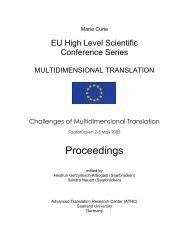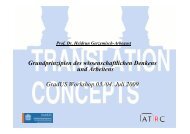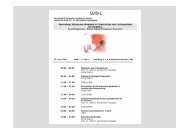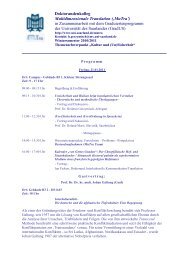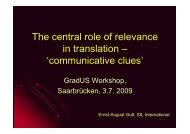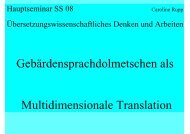Proceedings - Translation Concepts
Proceedings - Translation Concepts
Proceedings - Translation Concepts
Create successful ePaper yourself
Turn your PDF publications into a flip-book with our unique Google optimized e-Paper software.
3 Marked Structures<br />
MuTra 2006 – Audiovisual <strong>Translation</strong> Scenarios: Conference <strong>Proceedings</strong><br />
Lena Hamaidia<br />
The definition of a “marked” sentence or clause implies that it has features, which distinguish<br />
it from an “unmarked” type of sentence and indeed that the unmarked is the preferred or<br />
standard form (Schmid 1999:45). This also implies that the same sentence elements could be<br />
presented in either the marked or the unmarked order however the marked sentence stands out<br />
as unusual in implicit comparison with the conventionally ordered unmarked sentence.<br />
Although the “unmarked” sentence could be described as standard or conventional this does<br />
not mean that it is used more often than the “marked” sentence. Indeed, Dryer argues that<br />
unmarked word order is not necessarily used more frequently than marked word order and<br />
considers the term “default word order” to be a more accurate definition of pragmatically<br />
unmarked word order (Dryer 1995:105).<br />
As the purpose of a marked sentence is to express the communicative intention of the<br />
speaker it is “cognitively more complex” than the unmarked version. The information content<br />
of both marked and unmarked versions of the same sentence may be the same but the use of a<br />
marked structure generally communicates a different shade of meaning (Haiman 1980:517)<br />
For example, by changing the SVO sequence to OSV in the following sentence the<br />
object “you” is brought into sharp focus in comparison with the same word in the same<br />
sentence with the elements arranged in the standard SVO sequence:<br />
Marked word order:<br />
“Bua








